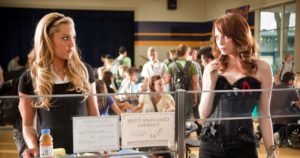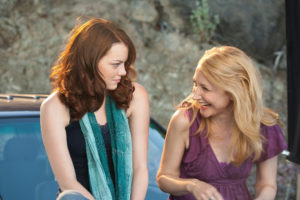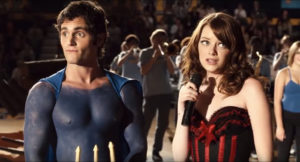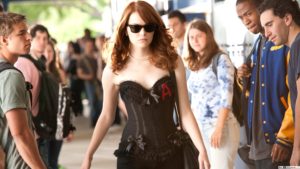Demonic Is Trippy Sci-Fi Fun, and That’s About It
It's good for your film viewing needs, but isn’t going to shake your world. Demonic is trippy sci-fi fun, and that’s about it. And that's pretty cool.
Incluvie Foundation Gala - Learn More


As minor as it may be, if there’s any silver lining to the lumpish state of the quarantine era, my argument is the push to revisit older cinema.
I mean to some level it was mandatory; these were days that a Sunday trip to the local cinema was deadly. But still, I do enjoy that we all learned to appreciate what has already come, including myself. As I was rewatching the bigger releases, I noticed a troubling phenomenon emerge ever so subtly. There was what I expected: films that I viewed as progressive, and films that I knew were troubling and still are. But the newest addition were films that in my youth felt like a point in the right direction, but on the revisit felt more like they were way behind me. And nothing fit more into that category than the 2010 release Easy A. Easy A is pretty anti sex.
Now before we plan my execution, I would like to say I still enjoyed the film! It exudes a charming energy that makes it fun to watch, the cast are all pretty good actors, and the script had a lot of dialogue that feels both cringe inducing and also extremely nostalgic. And speaking of the late 2000s, it’s not lost on me that Easy A features somewhat forward female depictions in a time when those were effectively endangered. None of the ladies involved are supposed to be good or bad really, more so unconscious players in a system where they are set up to lose. The film does have nods to how female sexuality is weaponized and used as a pseudo-Star of David, informing how we should all treat them. This is why I like the tie in with The Scarlet Letter and the idea that visual metaphor carries. The setup of this conversation is fine. Where things become murky for me is in the execution. By the end, the film revels in the idea that there is nothing wrong with being a woman with a sexuality, and I agree, but there’s one problem: none of the women do!

The movie has two sets of foils that our heroine comes in close quarters with through the film. The first two are her age: Marianne and Rhiannon. Marianne is your classic God-fearing girlie who is on the front lines, fighting for the purity we all need in our lives. But through the film it becomes debatable how much of these beliefs are hers. Marianne’s father is a Father of the local church. Via dialogue from both him and her, the picture suggests that Marianne is the way she is because of the men in her life. And then, at a particularly low point, she reveals that she went back on these celibate sermons to keep her boyfriend. This, in turn, leads to a quick friendship with Olive, but they return to enemies because of her boyfriend.
Then there’s Rhiannon, Olive’s best friend, who is also obsessive, but not about some boring guy. Instead, she chases the concept of sleeping with boring men in general. Rhiannon wants sex, but we see through her fight with Olive that her reason is less because she thinks it will be enjoyable and more because of the status. That word is at the core of both of these young women’s storylines. They both perform personalities seated next to sex, and they both curate said personalities to the public by being aggressive about their stance. Marianne is against and Rhiannon is pro, but both don’t really care about the actual action as much as they care about what sex says about them! And again, to some degree I do find that interesting but also troubling, especially in relation to the second set of foils.

The other two women, unlike most of the cast, aren’t virgins. Their scenes give us the most insight on what the film is trying to say. Because really, they are positioned to be two paths that Olive could potentially go down. The first is her mother and the second is Mrs. Griffith. These are two seemingly capable adults who sit with teens and pass upon their wisdom. In the case of Olive’s mother, she talks about how she did have her days of danger and debauchery, but that all the crazy sex meant nothing to her. All of it was meaningless and just a way to cover up a deeper inward problem, a problem that mysteriously vanished once she got in a relationship with Olive’s dad and raised his children.
But we also have Mrs. Griffith, the only woman to want sex, and the one who gets it via infidelity. The movie’s true themes about women’s sexuality are revealed in Mrs. Griffith’s situation. The man she cheats with is the slow-witted Micah who’s had to repeat high school multiple times and is the film’s resident douche bag. The guy she cheats on is Mr. Griffith, the well-meaning, favorite teacher and our main character’s moral compass. The message is obvious: mother gets calming scenes in her beautiful house or parked on a scenic LA view because she learned to put her hoe days behind her. Whereas Mrs. Griffith gets manic handhelds in a tiny under-funded office where she has destructive episodes because she just couldn’t say no! As you look at these four it’s not hard to piece out what the film is saying about women and sex, but also why they wrote Olive to be the way she is.

Olive is different. She’s not like other girls. She, in essence, wears sneakers and sits on the bleachers. In a plot where everyone judges women based on if they have had sex or not, her differing factor could easily have been that she wants to have sex or that she finds herself attracted to more than one guy and wants to do something about it. But instead, the movie not only doesn’t have her go down that path, but it acts like it was never an option. Of the many men who she strikes deals with, most of them want to have pretend sex with her because they feel like they’re viewed as unattractive by their peers, which she never combats. We could have seen her want to hook up with guys of different sizes, racial backgrounds, and interest. But no, the movie frames her relationship to them as exclusively about pity! She’ll listen to them whimper about not getting any, and it’ll make her feel bad, but obviously she would never want to be with them! No, she wants the two guys that happen to be the most conventionally attractive! And lets zero in on the two guys she is attracted to; the first is a creep, which… okay I guess… and the second is her obvious endgame boyfriend. Early on, Olive gives us a monologue about how she wants real 80s movie romance where guys make big gestures and girls look like walking magazines. Obvious endgame boyfriend seems to only want to be that and nothing else. He only pops up to talk to her, never about her very public fake sex life, and honestly doesn’t really show any level of physical attraction to her until they kiss. And in that moment, the first time that we see her with someone that we know she wants to be with, the film still writes her to decline. Which yes, it’s great he asked for consent and respected her answer, but I can’t help but feel like her answer was because of the underlining truth to this film. It’s ok to think about sex, it’s ok to acknowledge that sex is a thing you might like, and it’s ok to have sex when you’re in a relationship. But to want casual sex, to go against monogamy, is a giant no-go.

This movie makes consistent references to religion and text where religious beliefs are robust. The film’s name is in reference to The Scarlet Letter, which is high-key just slut shaming, the novel. There’s potential there. It would have been genuinely strong if Olive was sexually open and still chose to push against the judging eyes of her peers. But she’s not. She is aggressively not, and so her advocacy is all about spectacle. She’s a white able-bodied girl who’s convinced herself she is pushing up against a system, when really, she’s just cosplaying. She is performing the role of a less taboo Amber Rose. The movie ends with her reveling about being the school whore as she struts around in a sort of lingerie look, only to immediately, unironically, ride off into the sunset with obvious endgame boyfriend! From this, it’s clear the story never really cared about anyone’s sexual agency. It only cared about status, and sex was just a decider of who’s in and who isn’t.
Easy A is emblematic of a world that liked to sarcastically pretend it was progressive but wasn’t actually ready for that change. This was the era right after Superbad, American Pie, and Sorority Boys. Hell, even undeniable classics of the genre like Mean Girls don’t have the best sex politics. All of these use sex as a comedic through line, as a theme even, but not as an answer, and especially not for women. But every film must grow old, and the fact that Easy A is aging is a good sign for the future. Perhaps it’s a sign that cinema will allow teen girls to just be the slut, and perhaps in the next teen comedy, she will be. For this one though, Easy A is pretty anti sex.
Related lists created by the same author
It's good for your film viewing needs, but isn’t going to shake your world. Demonic is trippy sci-fi fun, and that’s about it. And that's pretty cool.
Related movie/TV/List/Topic
Love, Simon (2018) based on the book “Simon vs The Homo Sapiens Agenda” (by Becky Albertalli) is a teen LGBTQ+ rom-com with themes of longing to find others with similar struggles, and ultimately is a story of acceptance of identity from those around you, and most importantly, from yourself.